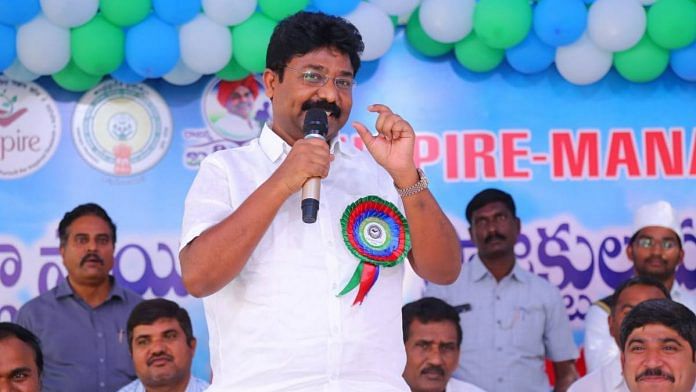Bengaluru: Two Southern states are locked in a language war, with Karnataka taking “serious exception” to Andhra Pradesh making English the medium of instruction in its government schools.
The Karnataka Primary and Secondary Education Minister Suresh Kumar had written to Andhra Pradesh Chief Minister Y.S. Jagan Mohan Reddy objecting to the latter’s two-language formula on the grounds that it deprives Kannadigas living in the border areas of Andhra an opportunity to learn in their mother tongue.
“The Andhra Pradesh government’s decision to convert all government schools into English medium and compel every student to learn Telugu or Urdu as one of the languages has defied the spirit of bonhomie that has always existed between each of our states,” reads Kumar’s letter dated 28 January.
“This impacts the morale of Kannadigas residing in border areas of Andhra Pradesh who did their schooling in Kannada medium all these years.”
The border areas of Chittoor and Anantapur in Andhra Pradesh have sizeable Kannadiga populations.
Also read: Postcard News co-founder ‘heckled’ at Mangaluru airport, asked to sing Vande Mataram
‘Karnataka’s apprehensions unnecessary’
Responding to the letter, however, the Andhra Pradesh Education Minister Audimulapu Suresh told ThePrint that the apprehensions expressed by the Karnataka minister were unnecessary as the state has no plans to either stop the teaching of Kannada or shut down Kananda medium or any other government-aided linguistic minority schools.
“We respect the spirit of linguistic minorities rights as envisioned in the Constitution,” Suresh told ThePrint over the telephone. “Kannada-medium schools will continue to function but the medium of instruction will be English. Kannada can be taught as a subject.”
Suresh clarified that according to the new law, all government schools will rely on English as the “medium of instruction” while Telugu has been made compulsory. Other languages such as Urdu, Tamil, Odia and Kannada will continue to be taught, he said.
“Kannada will continue to be taught as a language but in that case, in such linguistic minority schools, Hindi will not be taught. For example in a Kannada-medium school, while subjects will be taught in English, the children will be taught Kannada and Telugu compulsorily,” Suresh added.
“So where is the confusion? Learning English will only help them face their future better. We are giving them an added advantage and not making it a disadvantage,” he further said.
Karnataka’s apprehensions come even as it has made Kannada compulsory in its schools, even the private ones. Kumar himself had on 3 January made it clear that schools in Karnataka will have to strictly adhere to a 2015 law that made teaching Kannada compulsory.
Political scientist Sandeep Shastri alluded to this while commenting on the controversy. “While it is important to safeguard the interest of your language in other states, you should also concede that languages that are not predominant in your state should be protected in a similar way,” said Shastri, who is also the Vice-Chancellor of the Bengaluru-based Jain University.
ThePrint reached Karnataka Primary Education Minister Suresh Kumar for a comment through phone calls and messages but he is yet to respond.
Also read: Karnataka govt gives CBI permission to indict 2 IPS officers in multi-core IMA ponzi scam
The new Andhra law
The Andhra Pradesh Legislative Assembly had on 23 January ratified the Andhra Pradesh School Education Regulatory and Monitoring Commission (Amendment) Bill 2019.
Through this, the government decided to replace Telugu as the medium of instruction for classes 1 to 6 in all government schools in the state. This will come into effect from the 2020-21 academic year.
Telugu or Urdu will be compulsory subjects, while linguistic minority schools operating in border states of Karnataka, Tamil Nadu or Odisha will be able to teach their native tongues.
While the Bill had already been passed by the Assembly during the winter session in December, it faced a major hurdle in the AP Legislative council that is dominated by representatives of the opposition Telugu Desam Party (TDP).
Several members who opposed the bill said that the government should concentrate on preserving Telugu as a language and also give children the choice to choose between Telugu and English medium.
Despite the opposition, the AP assembly passed the bill for a second time rejecting any amendments.
Chief Minister Jagan Mohan Reddy, while speaking in the Assembly, said that the move to introduce English as a medium in government schools was being welcomed by the thousands of parents who belong to the SC, ST, minorities and socio-economically backward communities who are unable to afford English-medium education in private schools.
Also read: Yediyurappa in a fix as Amit Shah against minister posts for all 11 rebels who won bypolls




Andhra makes English the ‘medium of instruction’ in its schools. By far the most sensible policy decision taken in India since 1991. Pity, it is one state.